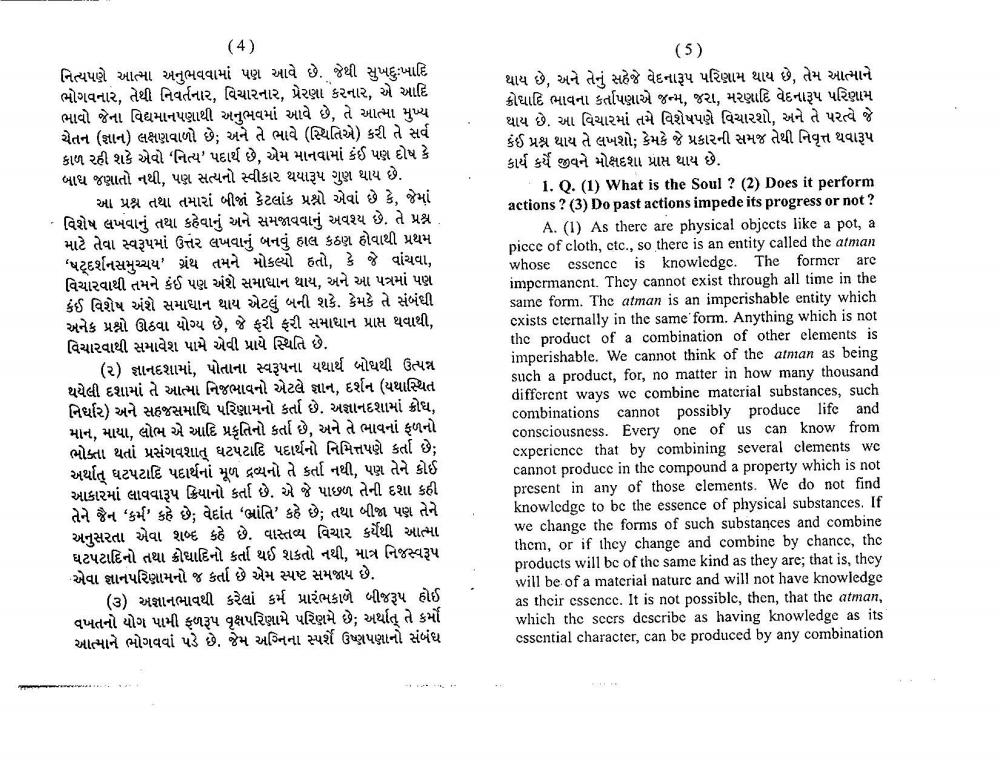________________
(4)
નિત્યપણે આત્મા અનુભવવામાં પણ આવે છે. જેથી સુખદુઃખાદિ ભોગવનાર, તેથી નિવર્તનાર, વિચારનાર, પ્રેરણા કરનાર, એ આદિ ભાવો જેના વિદ્યમાનપણાથી અનુભવમાં આવે છે, તે આત્મા મુખ્ય ચેતન (જ્ઞાન) લક્ષણવાળો છે; અને તે ભાવે (સ્થિતિએ) કરી તે સર્વ કાળ રહી શકે એવો ‘નિત્ય’ પદાર્થ છે, એમ માનવામાં કંઈ પણ દોષ કે બાઘ જણાતો નથી, પણ સત્યનો સ્વીકાર થયારૂપ ગુણ થાય છે.
આ પ્રશ્ન તથા તમારાં બીજાં કેટલાંક પ્રશ્નો એવાં છે કે, જેમાં વિશેષ લખવાનું તથા કહેવાનું અને સમજાવવાનું અવશ્ય છે. તે પ્રશ્ન માટે તેવા સ્વરૂપમાં ઉત્તર લખવાનું બનવું હાલ કઠણ હોવાથી પ્રથમ ‘દર્શનસમુચ્ચય' ગ્રંથ તમને મોકલ્યો હતો, કે જે વાંચવા, વિચારવાથી તમને કંઈ પણ અંશે સમાધાન થાય, અને આ પત્રમાં પણ કંઈ વિશેષ અંશે સમાઘાન થાય એટલું બની શકે. કેમકે તે સંબંધી અનેક પ્રશ્નો ઊઠવા યોગ્ય છે, જે ફરી ફરી સમાધાન પ્રાપ્ત થવાથી, વિચારવાથી સમાવેશ પામે એવી પ્રાયે સ્થિતિ છે.
(૨) જ્ઞાનદશામાં, પોતાના સ્વરૂપના યથાર્થ બોધથી ઉત્પન્ન થયેલી દશામાં તે આત્મા નિજભાવનો એટલે જ્ઞાન, દર્શન (યથાસ્થિત નિર્ધાર) અને સહજસમાધિ પરિણામનો કર્તા છે. અજ્ઞાનદશામાં ક્રોધ, માન, માયા, લોભ એ આદિ પ્રકૃતિનો કર્તા છે, અને તે ભાવનાં ફળનો ભોક્તા થતાં પ્રસંગવશાત્ ઘટપટાદિ પદાર્થનો નિમિત્તપણે કર્તા છે; અર્થાત્ ઘટપટાદિ પદાર્થનાં મૂળ દ્રવ્યનો તે કર્તા નથી, પણ તેને કોઈ આકારમાં લાવવારૂપ ક્રિયાનો કર્તા છે. એ જે પાછળ તેની દશા કહી તેને જૈન ‘કર્મ' કહે છે; વેદાંત ‘ભ્રાંતિ’ કહે છે; તથા બીજા પણ તેને અનુસરતા એવા શબ્દ હે છે. વાસ્તવ્ય વિચાર કર્યેથી આત્મા ઘટપટાદિનો તથા ક્રોધાદિનો કર્તા થઈ શકતો નથી, માત્ર નિજસ્વરૂપ એવા જ્ઞાનપરિણામનો જ કર્તા એમ સ્પષ્ટ સમજાય છે.
(૩) અજ્ઞાનભાવથી કરેલાં કર્મ પ્રારંભકાળે બીજરૂપ હોઈ વખતનો યોગ પામી ફળરૂપ વૃક્ષપરિણામે પરિણમે છે; અર્થાત્ તે કર્મો આત્માને ભોગવવાં પડે છે, જેમ અગ્નિના સ્પર્શે ઉષ્ણપણાનો સંબંધ
(5)
થાય છે, અને તેનું સહેજે વેદનારૂપ પરિણામ થાય છે, તેમ આત્માને ક્રોથાદિ ભાવના કર્તાપણાએ જન્મ, જરા, મરણાદિ વેદનારૂપ પરિણામ થાય છે. આ વિચારમાં તમે વિશેષપણે વિચારશો, અને તે પરત્વે જે કંઈ પ્રશ્ન થાય તે લખશો; કેમકે જે પ્રકારની સમજ તેથી નિવૃત્ત થવારૂપ કાર્ય કર્યે જીવને મોક્ષદશા પ્રાપ્ત થાય છે.
1. Q. (1) What is the Soul ? (2) Does it perform actions ? (3) Do past actions impede its progress or not?
A. (1) As there are physical objects like a pot, a picce of cloth, etc., so there is an entity called the atman whose essence is knowledge. The former are impermanent. They cannot exist through all time in the same form. The atman is an imperishable entity which exists eternally in the same form. Anything which is not the product of a combination of other elements is imperishable. We cannot think of the atman as being such a product, for, no matter in how many thousand different ways we combine material substances, such combinations cannot possibly produce life and consciousness. Every one of us can know from experience that by combining several clements we cannot produce in the compound a property which is not present in any of those elements. We do not find knowledge to be the essence of physical substances. If we change the forms of such substances and combine them, or if they change and combine by chance, the products will be of the same kind as they are; that is, they will be of a material nature and will not have knowledge as their essence. It is not possible, then, that the atman, which the seers describe as having knowledge as its essential character, can be produced by any combination




